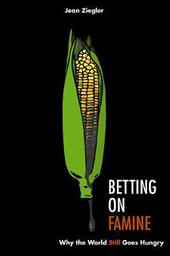
|
Betting On Famine: Why The World Still Goes Hungry
Hardback
Main Details
| Title |
Betting On Famine: Why The World Still Goes Hungry
|
| Authors and Contributors |
By (author) Jean Ziegler
|
|
Translated by Christopher Caines
|
| Physical Properties |
| Format:Hardback | | Pages:288 | | Dimensions(mm): Height 215,Width 147 |
|
| ISBN/Barcode |
9781595588494
|
| Classifications | Dewey:363.8 363.8 |
|---|
| Audience | |
|---|
|
Publishing Details |
| Publisher |
The New Press
|
| Imprint |
The New Press
|
| Publication Date |
12 September 2013 |
| Publication Country |
United Kingdom
|
Description
Few know that world hunger was very nearly eradicated not long ago. However, widespread starvation has suddenly reappeared, and chronic hunger is once again a major issue. In an investigation of this disturbing shift, Jean Ziegler - one of the world's leading food experts #NAME? new sustainable revolution has diverted millions of acres of corn, soy, wheat and other grain crops from food to fuel. Betting on Famine will enlighten all who are concerned about the politics of food.
Author Biography
From 2000 to 2008 Jean Ziegler was the UN Special Rapporteur on the Right to Food. Formerly a member of the Swiss Parliament, Ziegler is the author of numerous books, including "The Swiss, the Gold and the Dead," which details the role of Swiss banks in illegally holding the dormant bank accounts of Jewish victims of the Holocaust. He lives in Switzerland. Christopher Caines is the translator of "World War II: The Unseen Visual History." His original essays have appeared in several periodicals, scholarly reference works, and anthologies, including "Reading Dance." Caines lives in New York City.
Reviews"During his 2000 2008 tenure as U.N. special rapporteur on the right to food, Ziegler . . . traveled worldwide to understand hunger and the international policies that he believes cause it (including those that promote the use of crops for biofuels). In this devastating book, he describes the horrors of food insecurity, the callousness of 'crusaders of neoliberalism' who control food and land access, and the individuals and grassroots organizations fighting for subsistence farmers and the right to food. Interspersed with statistics and policy critiques are vivid depictions of victims of this crisis, giving readers a visceral sense of the reality of the 'mass destruction' caused by hunger and malnutrition." Publishers Weekly (starred review) "An impassioned and highly readable account of a major tragedy of our time. Ziegler brings together singular expertise and years of on-the-ground testimony in a pointed analysis that we can ignore only at our collective peril." Maude Barlow, chair of the Council of Canadians and author of Blue Covenant: The Global Water Crisis and the Fight for the Right to Water "Ziegler puts the desperation, sadness, and outrage of continuing hunger and malnutrition into the bright light of day and, in doing so, underscores the absolute insanity of the biofuel scam and the notion that we should be burning food to make motor fuel. This book is Ziegler's cri de coeur. It deserves attention. Even more, it demands action." Robert Bryce, senior fellow at the Manhattan Institute and author of Power Hungry: The Myths of Green Energy and the Real Fuels of the Future "Betting on Famine is the seminal book on global poverty and hunger. . . . Ziegler's compelling narrative, much of it based on firsthand experience, tells the heartbreaking and gripping story of how rapacious speculators and complicit bureaucrats are starving a billion people. . . . A persuasive call to action." Wenonah Hauter, executive director of Food & Water Watch and author of Foodopoly: The Battle Over the Future of Food and Farming in America "Passionate, well-researched, objective, and illuminating. . . . When we close this book, indignant, we know that those who die of hunger are victims of money and power." L'Express "Complex and rich. . . . In a learned and enticing manner, [Ziegler] intertwines timely data and observations of the terrain with illuminating descriptions of the inner workings of international organizations." Le Temps
|